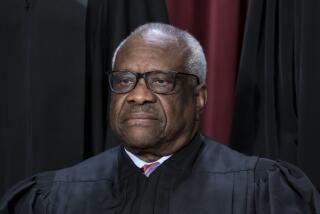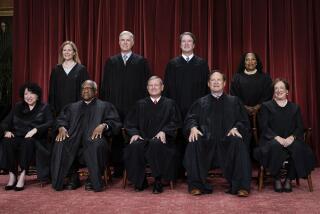Doubt Is Cast on Cruise Deal
- Share via
WASHINGTON — A prominent Democratic congressman said Thursday that internal company records showed that a controversial $236-million deal to lease three ships from Carnival Cruise Lines for emergency housing after Hurricane Katrina “looks lucrative for Carnival but exceptionally expensive for the taxpayer.”
In a six-page letter to Homeland Security Secretary Michael Chertoff, Rep. Henry A. Waxman (D-Los Angeles) said a January 2002 financial review made by Carnival and obtained by his staff cast “serious doubt” on the company’s assertion that it would not earn any additional profit on the deal with the government.
“This financial data reveals that the federal government appears to be paying Carnival significantly more under the federal contract than the ships earned on their own,” Waxman wrote, “while Carnival’s expenses appear to be significantly less under the federal contract than the ships normally incur.”
Bob Dickinson, Carnival’s president and chief executive, reacted angrily to Waxman’s letter, denying the company was profiteering and offering to open the firm’s books to government accountants to verify that it had not made excess profits. “The implication is that we’re snookering the taxpayers, and I deeply resent that,” Dickinson said in an interview.
“God bless someone in the country who tries to do the right thing because they will be pilloried. No good deed goes unpunished,” he said.
In late August, when Hurricane Katrina struck New Orleans and the surrounding Gulf Coast region, Carnival responded to a federal appeal for emergency housing by offering to lease three of its cruise ships. The deal was negotiated quickly, under pressure of the emergency. Carnival pledged that payments from the government would not exceed the profits the company would have made from normal operations.
But critics have suggested Carnival may end up doing better than simply breaking even on the deal.
Waxman, in his letter to Chertoff, urged the government to release more information on the contract, including the calculations used to set its terms. The pact will give Carnival $192 million over six months for about 7,100 berths, as well as reimbursement for up to $44 million in operating costs for fuel, waste removal, piloting and other expenses.
The ships were initially intended for evacuees but are being used primarily to house emergency workers.
A spokesman for Chertoff said that the department’s analysis showed that the cost of the cruise ships, which includes three meals daily and other services, was less than the amount the government would pay for hotel rooms in New Orleans for the workers. And he said using the ships had created vacancies in hotels for residents returning to help rebuild the city.
“These cruise ships are operating at virtual capacity and doing so at a significant savings for taxpayers,” said Homeland Security spokesman Russ Knocke.
Figures Knocke supplied showed that, as of Oct. 19, the three Carnival ships had 5,408 occupants, or 77% of their capacity.
Many of the cabins have more than one occupant. The Homeland Security assessment of the lower cost is based on single occupancy of hotel rooms. “It would be conceivable, but rare -- only in highly unusual circumstances -- for there to be more than one person in the same hotel room,” Knocke said.
Waxman said the financial data indicated that, under normal conditions, the revenue for the three ships for six months would total $150 million -- 57% less than the total in the government contract. He also said the company would have far lower expenses for employees, entertainment, maintenance and wear and tear than when the vessels were at sea.
At the occupancy rates as of Oct. 12, he said the cost to taxpayers for housing a family of five for six months would be $214,500. “For this price,” he said, “the taxpayer could purchase or build a permanent home.”
Waxman dismissed as “meaningless” a provision inserted into the contract at Carnival’s request about a month after the deal was signed requiring the company to return any excess profit based on its own “good faith” estimate. This “offers the taxpayer scant hope of relief,” he said.
Carnival’s Dickinson called Waxman’s letter “blatantly disingenuous,” but he declined to discuss any of the figures Waxman had cited from the internal review because the executive said the information was proprietary. He said the analysis was skewed because it covered the period after Sept. 11, 2001, when terrorists attacks devastated the travel industry, prompting Carnival and other companies to offer steep discounts.
Although Carnival will incur lower costs for such things as personnel and fuel, Dickinson said Waxman ignored other areas in which the company’s expenses would be higher, such as security and waste removal.
Carnival also had to recover the costs of 126,000 canceled bookings, refunds for travel agents’ commissions and the loss of on-board revenues such as casinos and alcoholic beverages, he said.
Dickinson, who made the decision to provide the company’s ships to the government, said Carnival was obligated to its shareholders to ensure the contract was “profit neutral.” He said Carnival had suggested such a provision at the time it signed the contract Sept. 2.
To assure that Carnival had not retained any additional profit, he said the company would be willing to open its books on a confidential basis to an agency such as the Government Accountability Office.
Despite the controversy over the contract, Dickinson said Carnival was proud of the service its ships were providing to 1,500 New Orleans police officers and other relief workers.
“Let Congressman Waxman go talk to the family of a New Orleans police officer who now has a roof over his head, three square meals and the comforts of home,” he said. “If they weren’t housed, they wouldn’t be in New Orleans. And if they weren’t in New Orleans, you wouldn’t have law and order ... or you would have had tanks on the streets.”
More to Read
Inside the business of entertainment
The Wide Shot brings you news, analysis and insights on everything from streaming wars to production — and what it all means for the future.
You may occasionally receive promotional content from the Los Angeles Times.










